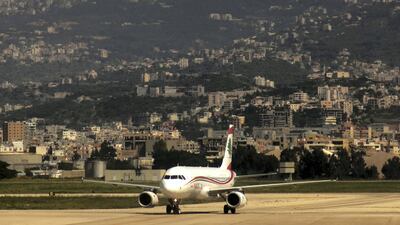Beirut Rafic Hariri International Airport, the only civilian hub in Lebanon, is woefully short of certified air traffic controllers – employing only a fifth of the number recommended by global standards.
Despite good candidates – some have already passed their exams – hiring has been delayed for months because of a problem that afflicts much of the public sector: the pool of potential recruits is not representative enough of the country's numerous religions and sects.
According to international guidelines the capital's airport should have between 80 and 100 approved controllers, but it only has 19. A further 19 are working as assistant air traffic controllers but have not been properly certified – despite some having been in position for as long as eight years, airport insiders told The National.
The disclosure comes as summer passenger traffic surges, largely from expatriates returning on holiday.
About 8.23 million used Rafic Hariri International Airport last year, authorities said in February. That number is expected to reach 10 million by 2020.
Since the start of the Syrian conflict, traffic through Beirut has increased rapidly as people fly into Lebanon and continue overland to the border.
"There have been no accidents, thank God, until now we are working," said one airport employee speaking on condition of anonymity.
"To have people working without licences, it's very dangerous. Plus we have people who should be retired still working to support us. This is dangerous."
Last August, a further 25 candidates passed the civil service exam to become an air traffic controller. None have been officially hired yet, as the document that would formalise their positions has not been signed by President Michel Aoun.
Members of that group, as well as current airport employees, told The National that only two of the people who passed the exam were Christians, and that they believed that was the reason for the delay. As with the position of president, speaker of parliament and prime minister, public sector positions across the board have to maintain a confessional balance across the country's sects and denominations. This additional hiring consideration comes on top of finding qualified candidates, and can delay public sector appointments for years.
____________________
Read more:
Lebanon forecasting GDP to debt ratio to stabilise at 149 per cent in 2018
Emirates to operate A380 test flight to Beirut, resume second Portugal route
Flying into the future: how airports around the world are being redefined
____________________
Preserving sectarian quotas within Lebanon’s government is a priority of Christians.
The country has gone for more than 80 years without an official census, in part because its Christian community fears its numbers are in reality far fewer than the numbers upon which seats in government are apportioned. The Free Patriotic Movement, which Mr Aoun founded, has been championing a platform of restoring the rights of Lebanon’s Christians, including within the public sector.
Those who spoke to The National said that the number of Christians who passed the exam reflected the overall original number of Christian applicants – about 10 per cent in both cases.
Lebanon divides government positions into five categories. While the constitution called for an end to sectarian quotes in many public service jobs, the bill stipulates that tier one jobs be equally apportioned between Muslims and Christians. Air traffic controllers, however, are considered tier three or four positions depending on the candidate's experience, and although they do not legally require sectarian considerations in hiring, it is often common practice to maintain the balance.
The situation has left the new recruits frustrated, and often jobless, in the interim.
"I can't sign a contract with a company because I'm just waiting to follow up with this job," said one of the people who passed the exam last year. He declined to give his name for fear it could jeopardise his potential employment.
A spokesman for Mr Aoun’s office declined to comment on the matter, as did Prime Minister-designate Saad Hariri’s office.
The hold up presents a potential dilemma for travellers.
"You shouldn't be afraid, but you should be concerned," one airport employee said.
Lebanon's air traffic controllers oversee landings and take-offs from Beirut, but they also ensure the safe passage of all air traffic over Lebanese territory. Every plane crossing to Syria and beyond comes under the stewardship of Beirut's controllers for that leg of their trip.
Ali Hammoud, the head of the Lebanese Air Traffic Controllers Association, said bureaucracy often results in seemingly simple decisions taking months or even years, and that so far he had no reason to believe the decree would ultimately be rejected.
"In my case, when I was hired, it [took] a year and a half. The previous group was eight months to be hired," he said.
"This decree should be different due to the dire situation at the airport."
Despite the problems, the Lebanese government still has plans to renovate and expand the airport. This year, at an international donor conference for Lebanon, the government sought $500-million for such an overhaul.
In recent months, Lebanon’s air traffic controllers have held short, symbolic strikes – usually just an hour long and many times to coincide with Cabinet sessions – over wages and new hires.
The failure to implement promised raises and hire employees is a problem across the public sector in Lebanon, even as international financial organisations such as the IMF put pressure on Lebanon to cut its public sector further in an effort to manage the country's mounting public debt.


